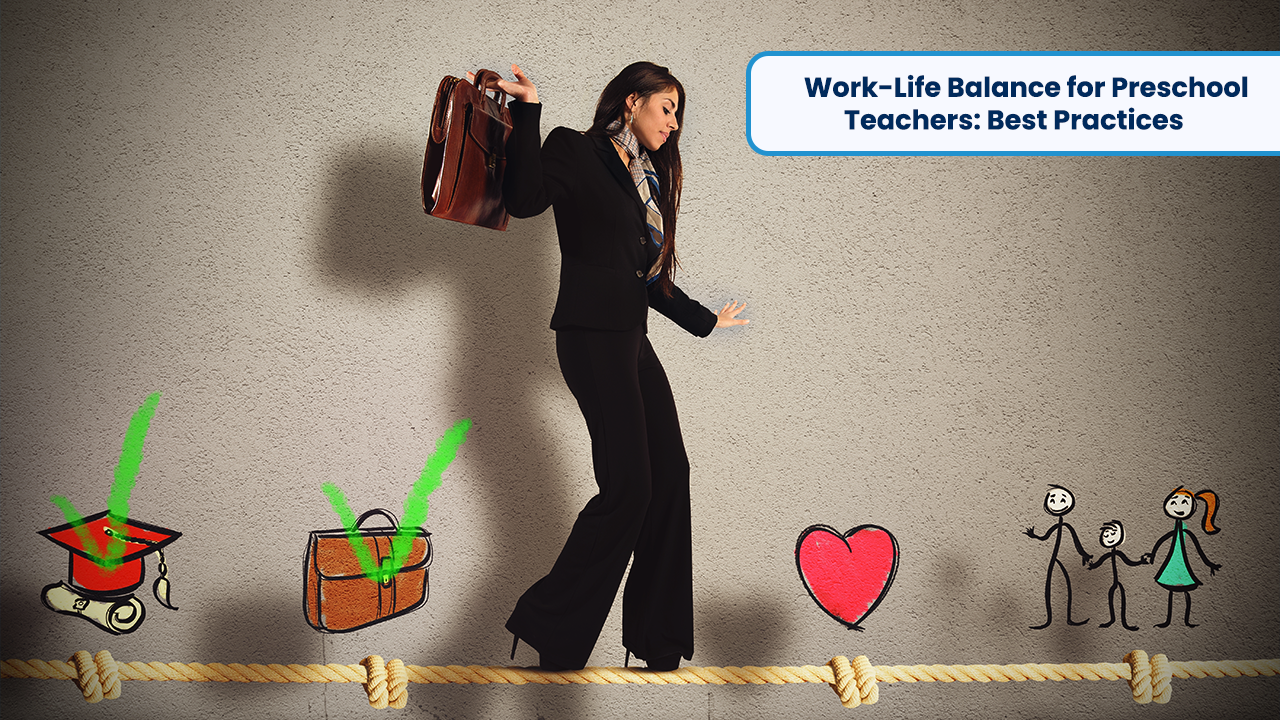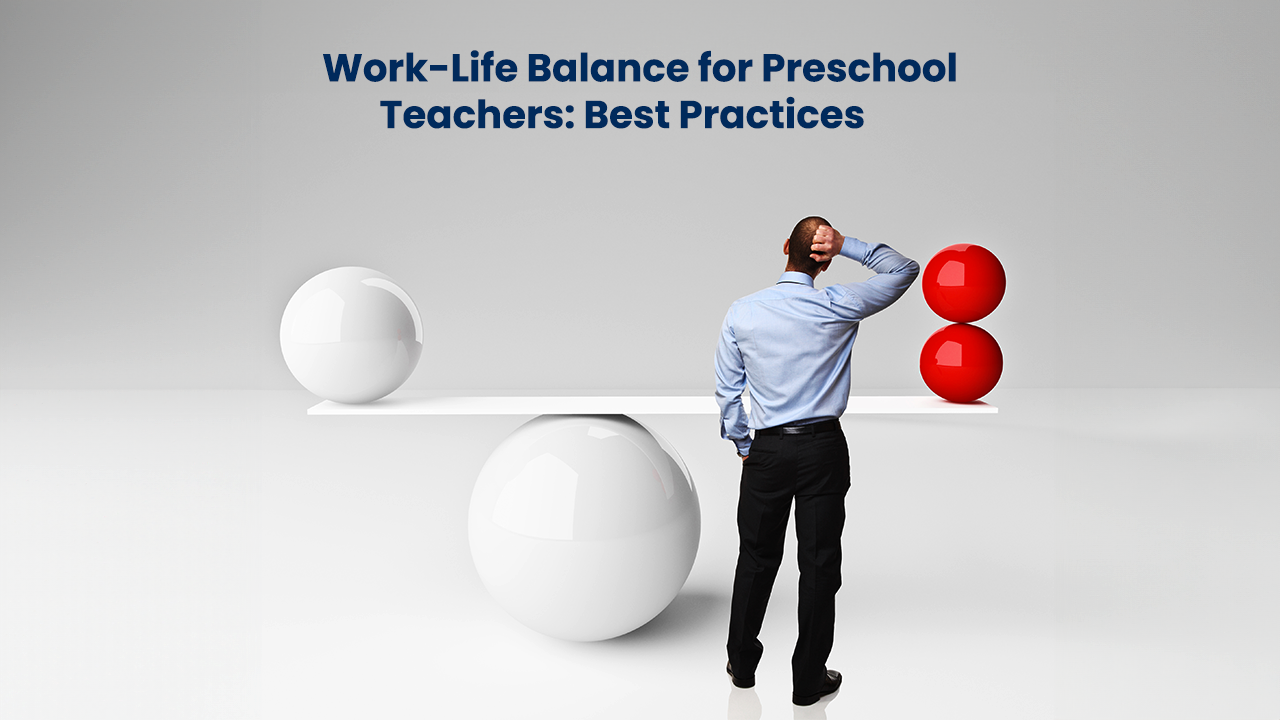
Preschool teachers are the unsung heroes of early childhood education, dedicating their time and energy to nurturing the minds and hearts of young children. However, amidst the joy and fulfillment of their profession, many preschool teachers grapple with the challenge of maintaining a healthy work-life balance. In this blog, we’ll explore the importance of work-life balance for preschool teachers, their unique demands, and practical strategies for achieving equilibrium in their professional and personal lives. Read also about the challenges facing preschool teachers.
The Importance of Work-Life Balance for Preschool Teachers
Physical and mental well-being:
Maintaining work-life balance is crucial for preserving preschool teachers’ physical and mental health. Teachers may experience burnout, exhaustion, and heightened stress levels without adequate time for rest, relaxation, and self-care, which can negatively impact their overall well-being.
Job Satisfaction and Motivation:
Striking a healthy equilibrium between professional duties and personal life significantly enhances job satisfaction and motivation for preschool teachers. When educators experience fulfillment and contentment in their roles, they are inclined to sustain their engagement and dedication to their work, thus mitigating the likelihood of turnover within the early childhood education sector.
Positive Relationships and Connections:
Work-life balance enables preschool teachers to invest time and energy into personal relationships and social activities outside the classroom. Nurturing these connections provides essential support and fulfillment, enriching teachers’ lives and contributing to their happiness and well-being.
Setting a positive example:
By prioritizing self-care and maintaining boundaries between work and personal life, preschool teachers set a positive example for young children and families. Teaching children the importance of balance and well-being from a young age fosters healthy habits and promotes social and emotional development in the classroom.
Effective Classroom Environment:
Teachers who achieve work-life balance are better equipped to create a positive and nurturing classroom environment. By managing their stress and maintaining a sense of fulfillment and purpose, teachers can provide the best possible care and support for young children, enhancing the quality of early childhood education.

Strategies for Achieving Work-Life Balance for Preschool Teachers
Achieving work-life balance is essential for the well-being and effectiveness of preschool teachers. Here are some strategies they can employ:
Set Boundaries:
Establishing clear boundaries between work and personal life is essential for maintaining balance. By defining specific start and end times for work-related tasks, preschool teachers can create a separation between their professional responsibilities and personal time, reducing the risk of burnout and allowing for relaxation and rejuvenation outside of work hours.
Prioritize Tasks:
Identifying and prioritizing tasks is vital to effective time management. Preschool teachers should focus on completing high-priority tasks first, ensuring that essential responsibilities are addressed promptly while allowing flexibility in handling less urgent tasks. Prioritization helps prevent feeling overwhelmed and ensures that time is allocated efficiently.
Create a schedule:
Planning days and weeks in advance provides structure and organization, helping preschool teachers manage their time more effectively. By allocating specific time slots for work responsibilities, self-care activities, and personal commitments, teachers can maintain a balanced schedule that allows for both productivity and relaxation.
Practice time management.
Time management strategies like the Pomodoro Technique or time blocking can enhance productivity and limit distractions for preschool teachers. Breaking down tasks into smaller, more manageable segments and dedicating focused time intervals for completion enables teachers to optimize their work hours, leading to heightened efficiency and decreased stress levels.
Learn to Say No:
Recognizing personal limits and setting boundaries is crucial for preserving work-life balance. Preschool teachers should feel empowered to decline additional responsibilities or commitments that may infringe on their time. Learning to say no allows teachers to prioritize activities aligned with their values and goals, ensuring they can dedicate time to meaningful and fulfilling activities.
Delegate Responsibilities:
Delegating tasks to colleagues, assistants, or volunteers can lighten the workload and create more time for personal activities. By sharing responsibilities and collaborating with others, preschool teachers can prevent feeling overwhelmed and ensure that tasks are completed efficiently, allowing for a better balance between work and personal life.
Practice Self-Care:
Carving out time for self-care practices like exercise, meditation, and meaningful interactions with loved ones is essential for nurturing holistic well-being. Immersing in activities that bring joy and relaxation enables preschool teachers to rejuvenate physically and mentally. By alleviating stress and cultivating resilience, these self-care rituals empower teachers to navigate the challenges inherent in their profession adeptly.
Set realistic expectations.
Setting realistic expectations for work and personal life helps preschool teachers avoid feeling overwhelmed and stressed. Instead of striving for perfection, teachers should focus on progressing and finding balance in their daily routines. Embracing imperfection and being kind to oneself fosters a healthier mindset and promotes overall well-being.
Seek Support:
Reaching out to colleagues, friends, and family members for support can offer valuable encouragement. Moreover, it provides guidance in managing work-life balance challenges. Preschool teachers can feel affirmed and assisted by exchanging experiences and seeking advice from individuals who comprehend the profession’s demands, fostering a sense of connection and camaraderie within their community.
Evaluate and adjust:
Regularly evaluating work-life balance and adjusting as needed is essential for maintaining equilibrium. Preschool teachers should pay attention to burnout signs and take steps to address them. whether modifying their schedule, seeking additional support, or reassessing priorities. Being flexible and adaptable ensures teachers can respond effectively to changing circumstances and maintain a healthy balance between work and personal life.
Conclusion:
Preschool teachers play a pivotal role in shaping children’s future success. They must also prioritize their well-being to sustain their positive influence in the classroom. Acknowledging the significance of work-life balance for preschool educators, implementing practical self-care and time management techniques, and fostering a supportive work atmosphere enable these teachers to strike a harmonious balance between their professional duties and personal lives. Read also about tips for preschool teachers to solve classroom management issues.


